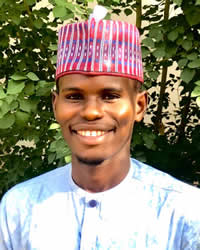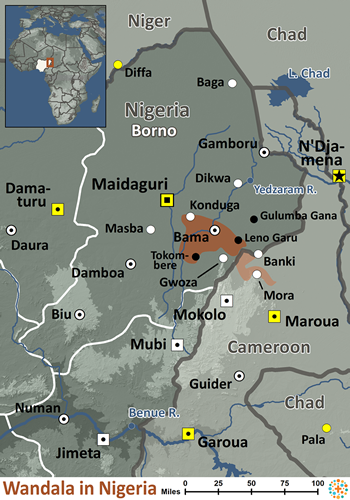The Mandara (or Wandala) tribe is located just south of Lake Chad in both northern Cameroon and in northeastern Nigeria. Their language, called Wandala (or Kirdi-Mora), belongs to the Chadic branch of the Afro-Asiatic language family. The Mandara occupy areas of the savanna in which there are mounds of rocks high above the plains.
Traditionally they had a stratified society. At the top were the sultans and royalty. Next came the farmers blacksmiths and other artisans. At the bottom were the slaves. They have long been remembered for their abilities with metal working.
Most of the Wandala survive by farming. They grow sorghum, corn and millet are their staple crops, but beans, peas, yams, pumpkins and tobacco. From the Egyptians they learned how to use of irrigation, manure fertilizer, and the cultivation of garlic, onions, melons and wheat. Animal husbandry is another important part of the Wandala's lives. Most families raise cattle, small horses, goats, sheep, dogs, chickens and bees all of which contribute to their livelihood.
There are local markets outside most Wandala villages. They sell specialized craft items and trade for various items.
Wandala men hunt, fish, clear the land for cultivation, herd livestock and trade with the caravan merchants. Women milk the cows and goats and also engage in trade. Women also do light farm work.
The Wandala live in compact villages that are grouped in rectangular compounds. Each compound, which contains several small huts, is surrounded by a dirt wall. The huts have straw thatch roofs and walls made of woven grass mats. A headman lives in the center of the village and oversees the entire community. An Islamic mosque is also located in the center of the village, and the religious leader assists the headman in the decision-making.
The Wandala live in a patriarchal (male dominated) society. All inheritances are passed down from fathers to their eldest sons. Wandala newlywedded couples live near the husband's family. A marriage usually involves the payment of a bride-price in the form of livestock or money. A Wandala man can have more than one wife, but his first wife is “chief” of any others.
The Wandala are almost all Malikite Muslim. Like other northern Cameroon, Sudanic-influenced tribes, Islam penetrates their communities. They adhere to the Islamic beliefs and traditions, which include praying five times a day, fasting during prescribed periods, and giving alms to the poor. Theirs is a religion of works based on the belief in one god, Allah, and in the teachings of his prophet, Mohammed. In addition to Islam, the Wandala people wear amulets with verses from the Koran.
The Wandala currently have the New Testament in their language, but not a complete Bible. Efforts to evangelize them have not won many to Christ, so they need spiritual hunger to get beyond where they are today.
Pray for the Lord to send dreams of the holy and sovereign God to Wandala family leaders.
Ask the Lord to call loving African believers to share Christ with Wandala neighbors.
Pray that God will save key Wandala leaders who will boldly proclaim the gospel.
Ask the Lord to raise up strong local churches among the Wandala in Nigeria.
Scripture Prayers for the Mandara, Wandala in Nigeria.
https://en.wikipedia.org/wiki/Mandara_people
https://www.mandaras.info/WandalaMandara.html
https://www.101lasttribes.com/tribes/mandara.html
https://articles.connectnigeria.com/ethnic-groups-in-nigeria-the-mandara-people/
| Profile Source: Joshua Project |


























